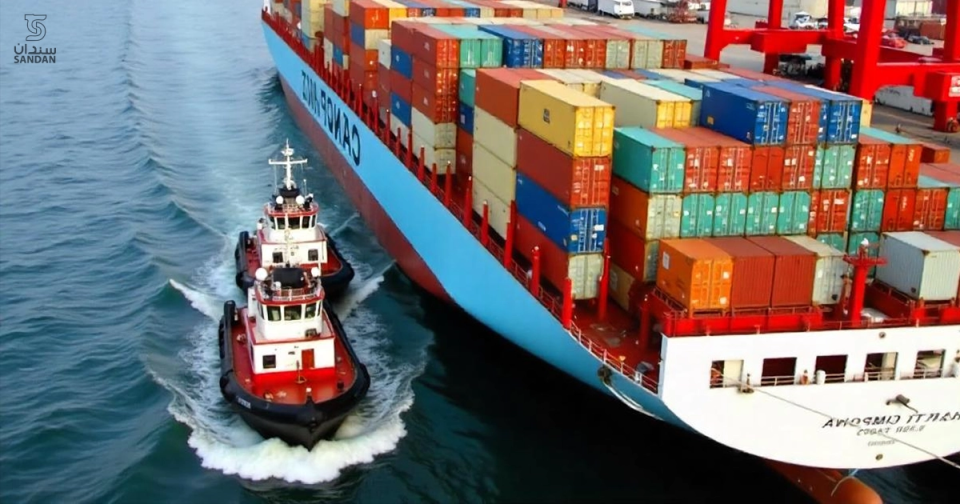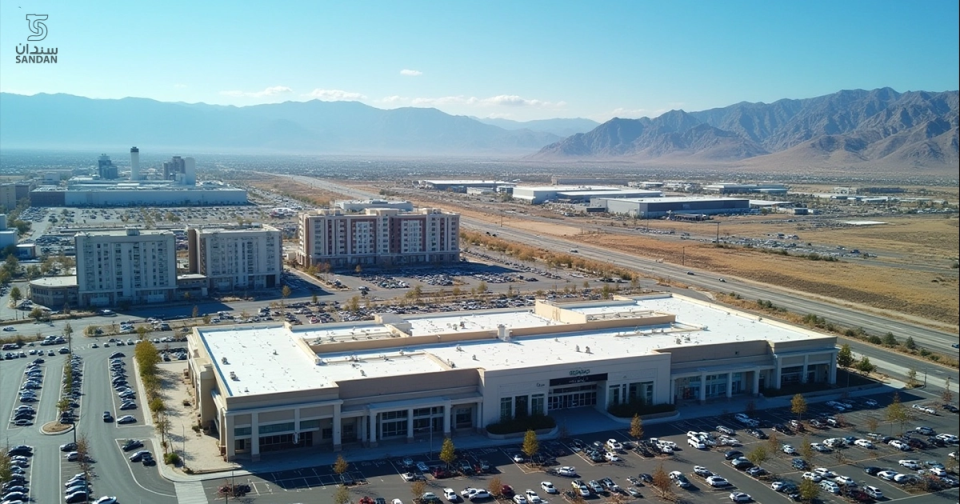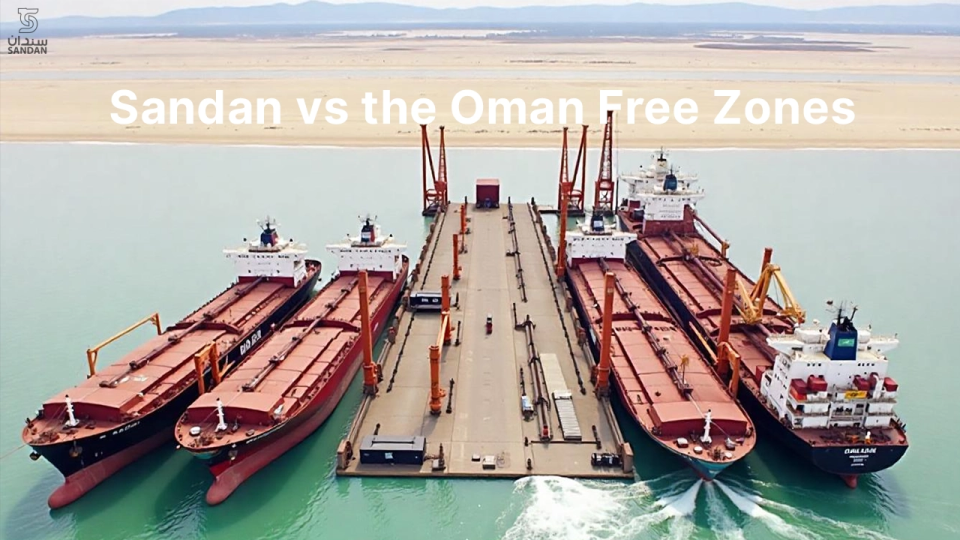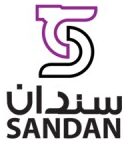Introduction
If you’re researching Oman free zones investment from a UAE base, you’ve probably heard two names over and over: the long-established coastal SEZs (Duqm, Sohar, Salalah, Khazaen) and the up-and-coming Sandan Industrial City on Muscat’s western edge. April 2025’s Royal Decree 38/2025 rewrote the playbook by giving all zones a single legal framework, streamlining one-stop licensing and, for the first time, opening the door to outright freehold ownership in designated projects. In the weeks since, Omani papers have flagged a spike in cross-border enquiries—especially from UAE manufacturers looking for lower land costs without losing Gulf-wide market reach.
This guide lines up Sandan against Oman’s big four free zones and scores them on the seven factors that matter most to investors: ownership structure, licensing speed, tax perks, land pricing, infrastructure, logistics reach and workforce depth. Read on, run the quick decision matrix, and decide which zone gives your project the fastest payback.
Key Takeaways:
- How freehold deeds at Sandan differ from 25-year renewable leases in other zones
- The latest land-lease rates in Duqm (as low as 0.5 OMR /m²/year) versus Sandan’s 35 000 OMR ready-built workshops
- Licensing turnaround times now averaged at seven to twelve days across zones
- Tax-holiday length, customs exemptions and VAT treatment at each location
- Utility-tariff and infrastructure contrasts, from rooftop-solar policies to deep-water ports
- Drive-time and sailing-time comparisons for UAE export routes
- A five-question scoring grid plus an ROI calculator to help you pick the best fit for your Oman free zones investment
1 Why 2025 is the perfect moment to benchmark every zone
Three fresh tailwinds collided this year and changed the math for anyone considering an Oman free zones investment. First, Royal Decree 38/2025 harmonised the rules for special-economic and free zones and, crucially, allowed selected projects—including Sandan Industrial City—to register outright freehold deeds. Second, each zone’s one-stop shop went fully digital, cutting average licence-issuance time to under ten working days. Finally, rents across the border in the UAE nudged higher after the 9 percent federal corporate-tax launch, prompting cost-sensitive factories and trading outfits to scout Muscat, Duqm and Sohar instead. Put those threads together and 2025 feels like the year you either lock in cheaper land or keep paying Gulf-high overheads.
2 Where everything sits—Muscat to Salalah at a glance
| Zone | From Muscat (road) | From UAE border (Hafeet) | Deep-water port on-site? | Closest airport | Quick vibe |
| Sandan Industrial City | 25 min west on Muscat Expressway | 3 hrs | No (45 min to Sohar) | MCT 20 min | Urban, SME-friendly, freehold deeds |
| Sohar Freezone | 2 hrs north-west | 1 hr | Yes – container & dry-bulk | OMA 15 min | Metals, logistics, petro-chem |
| Khazaen Economic City | 45 min north-west | 2 hrs | No (1 hr to Sohar) | MCT 35 min | Food logistics, e-commerce |
| Duqm SEZ | 6 hrs south | 7 hrs | Yes – multi-purpose | DQM on-site | Heavy industry, shipyard, energy |
| Salalah Free Zone | 10 hrs south | 11 hrs | Yes – trans-shipment mega-port | SLL 10 min | Regional hub for FMCG, auto, pharma |
Viewed on the map, Sandan occupies the only location that lets investors tap Muscat’s workforce and consumer base yet stay within a half-day truck haul of both Sohar Port and the Saudi/UAE borders. Coastal giants Duqm and Salalah win on duty-free export scale, while Sohar shines for metals and petrochemicals, but no other zone today couples freehold title with big-city convenience the way Sandan does.
3 Factor 1 – Ownership model & legal security
Until April 2025 every Omani free zone issued only long-term “usufruct” leases—typically 25 years, renewable once. Royal Decree 38/2025 broke that pattern by letting individual projects apply for outright freehold registration. Sandan Industrial City was the first Muscat-area zone to win approval, so buyers there receive a Ministry-of-Justice deed identical to what you’d get for a villa or office condo.
- Sandan – Freehold title in the company’s name; deed can be mortgaged or resold without zone-authority consent.
- Duqm, Sohar, Salalah, Khazaen – 25-year leases (Duqm and Salalah extendable to 50 years; Sohar to 40 years) that revert to the zone if you walk away or miss renewal deadlines.
- Registration fee – Sandan’s freehold transfer is a flat 3 % of declared value, while leases elsewhere carry 0.1 % notarisation plus an annual ground-rent invoice.
For investors who plan to build equity or use real estate as collateral, the deed in Muscat looks decisively stronger than a renewable lease 500 km down the coast.
4 Factor 2 – Licensing speed & bureaucracy
Oman’s central regulator (OPAZ) reports that all five zones now run fully digital “one-stop shops,” but average turnaround still varies.
| Zone | Avg. days to initial licence | Online portal? | E-signature accepted? | Comment |
| Sandan | 7 | Yes | Yes | Muscat location lets you walk in for same-day corrections |
| Sohar | 8 | Yes | Yes | Heavy-industry desk speeds HSE approvals |
| Salalah | 10 | Yes | Partial | Paper originals for customs code |
| Duqm | 12 | Yes | Yes | Extra step for environmental clearance |
| Khazaen | 9 | Yes | Yes | Still ironing out payment gateway |
Sandan edges ahead because its licensing counter sits inside Muscat municipality limits—so when a document needs a fresh stamp you’re 20 minutes from every ministry rather than two flights away.
Taken together, freehold security plus a one-week licence window explain why many UAE SMEs now short-list Sandan first when weighing an Oman free zones investment.
5 Factor 3 – Tax holidays, customs perks and VAT treatment
Oman gives every zone a flavour of “zero,” but the fine print differs enough to swing a pro-forma:
| Zone | Corporate-tax holiday | Customs duty on imports | VAT on local purchases | How it feels in practice |
| Sandan (mainland rules) | 0 % for most non-oil SMEs | 5 % (refunded on re-export) | 0 % on exports; 5 % on Oman sales | Works like Dubai mainland—but with zero CT |
| Sohar Freezone | 10 + 5 + 5 yrs (renewable) | 0 % | 0 % | Best for petro-chem and metals re-exports |
| Duqm SEZ | Up to 30 yrs | 0 % | 0 % | Flagship package aimed at mega-projects |
| Salalah Free Zone | 30 yrs | 0 % | 0 % | Longest “tax clock” for FMCG, pharma & auto |
| Khazaen | 15 yrs | 0 % | 0 % | Sweet spot for e-commerce and cold-chain |
If your model hinges on duty-free import and re-export, the coastal giants still win. But for businesses focused on Oman’s domestic market or GCC trucking lanes, Sandan’s zero income-tax and straightforward VAT refunds level the field—without locking you into zone-only staffing rules.

6 Factor 4 – Land and unit pricing plus payment terms
| Location | Typical land / unit cost (Q3-2025) | How you pay | Up-front cash hit |
| Sandan | 35 000 OMR for a finished 55 m² workshop (≈ 645 OMR/m²) | 40 % on SPA, 60 % over 18 months interest-free | 14 000 OMR |
| Sohar Freezone | Lease 2–3 OMR/m²/yr raw land; build cost extra | Annual ground rent in advance; build within 3 yrs | 100 % first-year rent |
| Duqm SEZ | Lease 0.5–1 OMR/m²/yr for large sites | Five-year rent upfront on strategic plots | Significant, but cheap per m² |
| Salalah Free Zone | Lease 1–1.5 OMR/m²/yr | Annual rent + performance bond | Moderate |
| Khazaen | Lease 1.8–2.2 OMR/m²/yr serviced plots | Annual | Moderate |
Sandan’s ready-built units look pricey on a headline m² basis, yet the instalment plan and zero fit-out wait mean you can open doors inside eight weeks and start capturing revenue while Duqm and Sohar projects are still pouring foundations. For SMEs without cash to front five years of ground rent, that speed-to-income edge often flips the ROI calculator green in Sandan’s favour.
7 Factor 5 – Infrastructure and utility pricing
No two zones wire the basics—power, water, broadband—in quite the same way, and those pennies per kilowatt-hour add up fast once the machines start humming.
| Zone | Grid capacity on tap | Industrial power tariff (bz/kWh) | Water tariff (bz/m³) | Any extras? |
| Sandan | 110 kV feeder, spare 60 MVA | 12–18 | 500–600 | Rooftop solar pre‐approved; fibre to every plot |
| Sohar Freezone | 220 kV dual feed | 14–20 | 450–550 | Steam network for petro-chem clusters |
| Duqm SEZ | 400 MW gas plant | 18–24 | 350–450 | Future green-hydrogen tie-in, still years out |
| Salalah Free Zone | 132 kV grid | 16–22 | 400–550 | Chilled-water option for food and pharma |
| Khazaen | 132 kV | 15–21 | 500–600 | District-cooling pilot in design |
Sandan’s headline numbers look lowest today, mainly because Muscat’s grid is already amortised and the zone’s rooftop-solar policy lets owners shave peak-hour bills a further 10–15 percent. Heavy-power users—think metal-formers and plastics extruders—still price-shop Duqm and Sohar, but most SMEs clock their cheapest blended utility cost inside Sandan.
8 Factor 6 – Logistics reach and time-to-market
Close your eyes and trace a pallet’s path from factory door to buyer. Road hours, port dwell time and air-freight cut-offs can erase any land-rent bargain you just negotiated.
| Zone | Port distance | Airport distance | Drive time to UAE (Hafeet) | What it means day-to-day |
| Sandan | 45 min to Sohar container terminal | 20 min to Muscat (MCT) | 3 h flat | Late-night trucking reaches Dubai markets before dawn |
| Sohar Freezone | On the quay | 15 min to OMA | 1 h | Fastest UAE cross-dock, priceless for perishables |
| Duqm SEZ | Inside port | On-site airport | 7 h | Export advantage, long haul for GCC trucking |
| Salalah Free Zone | Inside port | 10 min to SLL | 11 h | Great for East-Africa sea lanes, far from GCC |
| Khazaen | 1 h to Sohar | 35 min to MCT | 2 h | E-commerce sweet-spot for last-mile GCC delivery |
If your customers sit in Dubai, Abu Dhabi or Riyadh, every extra hour on the odometer chips away at repeat-order loyalty. Sandan wins by letting you ship dutiable goods through Sohar’s customs gate before lunch and still catch the evening cargo flights out of Muscat—something neither Salalah nor Duqm can match without paying air-freight premiums.
9 Factor 7 – Workforce depth and Omanisation obligations
Even the sharpest tax holiday falls flat if you can’t staff the factory floor, so talent supply—and the rules for hiring it—deserve a hard look.
- Sandan sits inside Muscat’s metro catchment, giving owners first dibs on vocational-college graduates and mid-career technicians who already live 25–40 minutes away. Omanisation starts at 15 percent for light-manufacturing licences and scales to 25 percent over three years, with a waiver during the first 12 months if your headcount is under 30.
- Sohar and Khazaen both recruit from Batinah’s industrial belt, where wages trend 10 percent below Muscat, but commute times push many skilled workers to ask for housing allowances.
- Duqm and Salalah draw from smaller local populations, so businesses fly in expatriate technicians on 8-week rotations; that satisfies quota math but raises travel and camp costs.
When payroll predictability counts more than rock-bottom land prices, being able to tap Muscat’s ready labour pool can keep your cost model sane.
10 Quick decision matrix – score your perfect zone
Use the grid below to translate strategy into numbers. Give each criterion one to five stars, multiply by the weight that matters to your business, and total both columns.
| Criterion | Weight (1–5) | Sandan | Duqm | Sohar | Salalah |
| Ownership security | × | ★★★★★ | ★★☆☆☆ | ★★☆☆☆ | ★★☆☆☆ |
| Licence speed | × | ★★★★★ | ★★★☆☆ | ★★★★☆ | ★★★☆☆ |
| Up-front cash | × | ★★★★☆ | ★★★☆☆ | ★★★☆☆ | ★★★☆☆ |
| Utility cost | × | ★★★★★ | ★★★☆☆ | ★★★★☆ | ★★★☆☆ |
| UAE logistics | × | ★★★★☆ | ★★☆☆☆ | ★★★★★ | ★★☆☆☆ |
| Duty-free perks | × | ★★☆☆☆ | ★★★★★ | ★★★★☆ | ★★★★★ |
| Workforce depth | × | ★★★★★ | ★★☆☆☆ | ★★★★☆ | ★★☆☆☆ |
Write your own weights in column two, multiply, and see which total climbs highest. Most UAE-facing SMEs find Sandan wins when ownership, licence speed and UAE logistics carry more than half the weighting. Heavy exporters chasing multi-decade tax holidays may still lean Duqm or Salalah. Either way, the matrix turns gut feeling into a defendable board-room number—just add it to the downloadable Excel linked at the end of this article.

11 Mini-case study – a UAE logistics SME chooses Sandan over Duqm
Farah runs a refrigerated-goods forwarding company in Sharjah. Her volumes are light—two 40-foot reefers a day—but delivery windows are brutal because supermarket shelves can’t wait. She compared Duqm’s zero-duty promise with Sandan’s freehold option and baked both into a five-year profit model.
- Land or unit cost: Sandan offered a finished 100 m² cold-store shell at 60 000 OMR with the 18-month, zero-interest plan; Duqm quoted a 3 000 m² serviced plot for 1 OMR / m² / year, five years’ rent upfront.
- Licence timing: Sandan issued all clearances in seven working days; Duqm’s environmental nod for cool-chain storage took 21.
- Logistics: door-to-Dubai transit from Sandan’s gate averaged 4 h 15 m; Duqm’s truck-and-tranship cycle topped 11 h even when the port schedule lined up.
Her spreadsheet said the duty-free waiver in Duqm saved 5 percent landed cost, but 48 extra hours on the road meant more dry-ice, more driver hours and less shelf life. The Sandan model paid back the down payment in 4.9 years, while the Duqm lease cracked breakeven only in year 7. Farah signed the Sandan SPA two weeks later.
12 Next steps – turning research into an Oman free zones investment you can touch
Ready to test the numbers against live inventory? Start with Sandan’s site-visit calendar. A five-percent refundable booking fee will lock your preferred unit while you finalise board approvals. Use the downloadable ROI calculator to feed in your exact cargo volume, payroll and duty mix—then run the same sheet for Duqm, Sohar or Salalah so the board sees apples-to-apples data.
If Sandan stays on top once the math is honest, the rest is a sprint:
- E-sign the sale–purchase agreement.
- File the deed with the on-site Ministry of Justice desk and pay the three-percent fee.
- Open utilities, fit the space, and upload your industrial-licence pack to the one-stop portal.
Most owners are moving product within eight to twelve weeks—proof that an Oman free zones investment can be quick, capital-light and, with a freehold deed in hand, surprisingly low risk.
Frequently asked questions
Can I mortgage a Sandan unit after purchase?
: Yes. Local banks treat the deed like any other real-estate title and lend up to 70 % of the appraised value.
Does Sandan qualify for the same duty-free privileges as Duqm or Sohar?
: Not automatically, but you can register as an export-processing firm and reclaim the 5 % customs duty on goods that leave Oman within 90 days.
What happens to my freehold deed if the zone expands or changes hands?
: The deed is registered with the Ministry of Justice, not the developer, so ownership stands regardless of management changes.
Are Omanisation rules tougher in Muscat than in out-port zones?
: Quotas are national. Sandan’s advantage is a larger local talent pool, making compliance cheaper and faster.
How fast can I exit if the business pivots?
: Typical resale cycles for industrial units in Muscat run 60-120 days; you can also lease the space short-term while marketing the asset.












